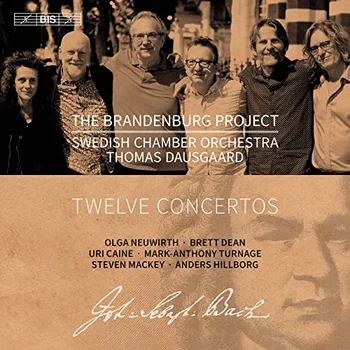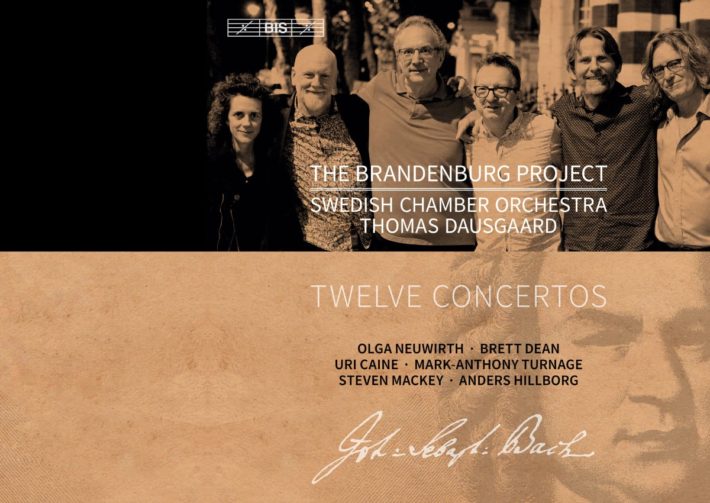In 2018, the Swedish Chamber Orchestra and conductor Thomas Dausgaard performed two concerts as part of the BBC Proms in London’s Royal Albert Hall. In a curious program, they paired each of Bach’s six Brandenburg concertos with a new commission as a companion piece. This is a studio made repeat of that program.

The performances of the Brandenburg concertos may not be to everyone’s taste. The use of modern instruments is welcomed, bringing a richness to the sound, with a particular sonority to the bass. The horns in the first concerto are worthy of special mentioning, as is Mahan Esfahani in the Fifth Concerto, where his subtle changes of timbre add something unconventional. Daussgard’s Brandenburg’s are characterized by vibrancy and buoyancy in the First, Second and Fifth Concertos, while the Third, Fourth and Sixth concertos are modestly restrained, but endearing. In a very crowded field, these performances are highly enjoyable, even if not overtly distinctive.
But the main interest of this set, as I see it, are the contemporary works and how they sit alongside the Baroque masterpieces. ‘Maya’ is the companion piece to concerto 1 by Mark-Anthony Turnage. Written for its namesake, cellist Maya Beiser, there is a distinctively eastern influence. It’s Keeping a similar instrumentation to the original concerto, but the group of soloists are replaced by a cello. This slow-moving 14 minute piece is extremely contrasting in terms of texture, harmony and structure. Darker, brooding and solemn, this is the most successful and accessible work of the six new pieces.
The companion piece to the Second Concerto by Steven Mackay is inserted before the last bar of the Concerto’s third movement. Entitled ‘Triceros’, the trumpet comes much more to the fore. As the title suggests, soloist Håkan Hardenberger plays three instruments —piccolo trumpet, flugelhorn and trumpet in C. The harmonic language is mostly accessible and the textures do contrast. Lasting almost 19 minutes, the work feels a little too long. The final bar of Bach’s concerto brings the whole experience to a close, which is quite a disorientating experience.
Olga Neiwirth’s ‘Aello — Ballet mécanomorphe’ comes after the Fourth Concerto. Neiwirth modifies the solo line up to a solo flute and two muted trumpets. Adding to the orchestral palette, she includes keyboard and typewriter. This serious — and at times very austere work, pushes the strings and flute to unconventional (and sometimes uncomfortable) extremes of the instruments.
The fifth Brandenburg and its companion, ‘Harsa’, do not sit comfortably together. Rather than following the models of Murray Perahia or Angela Hewitt in using the modern piano in this Brandenburg, Dausgaard opts for the original harpsichord. Yet in ‘Harsa’, composer Uri Caine takes to the piano, replacing its antique predecessor. Improvisation plays an important role in Caine’s work, but this 30 minute piece is overlong and lacks the compaction of musical argument found in the Bach.
Bach’s Third and Sixth concertos are for strings only as are their contemporary companions. Both ‘Bach Materia’ by Anders Hillborg and ‘Approach — Prelude to a Canon’ by Brett Dean are single-movements works. They are texturally and harmonically similar and make substantial demands on the listener, not sitting comfortably against their Bach counterparts. Pekka Kuusisto is an impressive soloist in ‘Bach Materia’, showcasing his unconventional ability to sing and play, but at 22 minutes this piece is an onerous listen. ‘Approach — Prelude to a Canon’ by Brett Dean is significantly shorter, but equally as dense. He chooses two solo violas and a harpsichord as soloists. His harmonic vocabulary is again demanding on the listener, lightning as it morphs into Bach’s beautiful sonorous Sixth Concerto, which in comparison comes as a welcome relief.
The playing is flawless throughout both from the Swedish Chamber Orchestra and all of the esteemed soloists. There is strong chemistry with the musicians who share in Dausgaard’s vision. The detailed BIS SACD recordings allow the musicianship to sparkle eloquently and all of the individual lines to be appreciated.
The contemporary pieces are not pastiches of their predecessors; they are works mostly in their own right using modern and contrasting idioms, while showcasing admirable, diverse and innovative writing. They are mostly challenging and demanding, even to experienced listeners, while not offering the same rewards as Bach’s equally innovative Brandenburgs. As a concept this is an intriguing and creative program indeed, but in execution it makes for a highly specialist album.
Recommended Comparisons
Bernardini | Alessandrini | Pinnock | Egarr
“The Brandenburg Project”
Bach – Brandenburg Concertos No. 1-6, BWV 1046-1051
Works by Mark-Anthony Turnage, Steven Mackey, Anders Hillborg, Olga Neuwirth, Uri Caine, Brett Dean,
Swedish Chamber Orchestra
Thomas Dausgaard – Conductor
BIS Records, Hybrid SACD BIS-2199



















